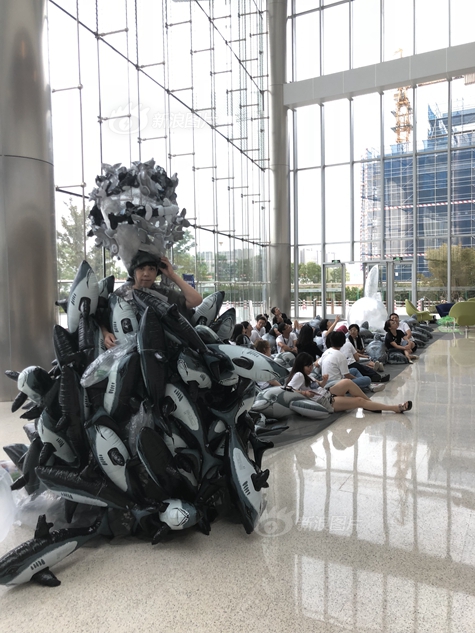【free sex video anal mom】Rally Held to Support Suehiro, Oppose Gentrification in Little Tokyo

By J.K. YAMAMOTO, Rafu Staff Writer
A “Justice for Suehiro” demonstration was held Dec. 10 in front of the Little Tokyo-Arts District Metro Station and in front of Suehiro on First Street.

Organized by Japantown Action & Solidarity (JAS), Save Our Seniors Network (SOSN) and Greater Los Angeles JACL, in coalition with other community groups, the event began at the station, with drumming provided by East L.A. Taiko, and continued with a march down First Street and a rally in front of the restaurant.
Founded in 1972, the popular eatery has faced eviction by landlord Anthony Sperl for months and recently opened a new location on Fourth and Main streets. Following a court hearing, owner Kenji Suzuki announced that he will keep the Little Tokyo location open through the holidays but will close it on Jan. 16.
Protestors said that this is part of a trend toward forcing out family-owned businesses and gentrifying the neighborhood. They carried signs with such messages as “Landlord beware — if you evict, you will not fit,” “Little Tokyo for the people, not big business,” “Meet and work with our community or we boycott your properties,” and “We survived incarceration, we fought redevelopment, we’ll defeat gentrification.”

The emcee was Zen Sekizawa of JAS, who noted, “I was born right over the bridge in Boyle Heights, and I grew up right here in Little Tokyo, right on this block. My entire childhood was spent on this corner at my family’s restaurant, the Atomic Café.”
She said that Sperl has filed paperwork to turn the Suehiro space into a marijuana dispensary and “wants to make Little Tokyo into the new Melrose.”
Sekizawa added, “We’re also fighting incoming developments such as the Continuum Partners’ Cold Storage Project right there on Fourth and Alameda,” which would result in several multi-story buildings adjacent to Little Tokyo Galleria and Centenary United Methodist Church.
“Our coalition is prepared to wage a long-term battle against gentrification and we are demanding that all landlords and all developers in Little Tokyo stop displacing our community members,” she said.

Suzuki was represented by his attorney, Clifford Jung, who said, “He really wants to thank all of you, everyone here today, for the support and for coming out and just showing him that you guys really care about what’s going on in Little Tokyo.”
When he was evicted, Suzuki “was really sad and depressed … to see how little Tokyo is changing,” Jung said, but now “Kenji is hopeful that all of you will continue to fight this and prevent Little Tokyo from changing … Kenji has promised that he shall return to Little Tokyo … He wants to come back.”
David Monkawa, co-chair of SOSN, said that the coalition is asking the landlord “to come in good faith, talk with the community about what they want to bring in … If he does not respond by the end of the year … to our letters, then we’re going to begin to gather names for a boycott petition.”
He said a similar request will be made to Continuum Partners, though “we don’t know if they’re going to respect us either.”

The coalition has learned from successful labor actions by United Teachers Los Angeles and the Screen Actors Guild as well as historical movements such as the bus boycott in Montgomery and the grape boycott in California, Monkawa said. “We can do it as well.”
Nancy Sekizawa, aka Atomic Nancy, is Zen’s mother and the former proprietor of Atomic Café. She recounted how her business was repeatedly asked to move until it ended up where the Metro station stands today.
Looking at a map of Little Tokyo from decades past, she said, “We had a huge area that we covered, and now what I see in 2023 is so small, it’s really shameful. Little Tokyo means a lot to me, as my daughter expressed … The community always used to come to our place, where we would support their little stores and flower shops … because we wanted to rebuild what we lost back in World War II.
“So this is why I stand very close to the younger people that are doing J-Town Action & Solidarity … We try to help each other and to see us being displaced, it just breaks my heart. So I’m here in solidarity with everybody.”

Nancy Uyemura, an artist who lived at the 800 Traction building for over 30 years, was instrumental in developing a vibrant Japanese American community of artists and activists in the area now known as the Arts District. She and fellow residents fought eviction by DLJ Real Estate Capital Partners but were finally forced to leave their long-time home, studios and community.
“The building (ownership) got switched over three times, I think, because I think they were just trying to flip it,” Uyemura said. “But, you know, there was some bad mojo because they kicked us out. They could have done it in a more thoughtful, more heartfelt way … I don’t know what the reasoning was because it’s the artists that made that area and without the artists, it’s not the Arts District …
“It was heartbreaking for us to have to move because we all gave so much to this community, and we still love this community … I just really want to be here in support of keeping our legacy businesses … because without this … we’re losing part of our home.”

Francine Imai shared about being the granddaughter of a thriving business owner in pre-war Little Tokyo. Her mother was one of the residents of Sakura Intermediate Care Facility in Boyle Heights who were evicted after its sale by Keiro to for-profit Pacifica for development into market-rate apartments, and she passed away from transfer trauma soon after her relocation.
Joyce Valenzuela spoke about her father, who immigrated to the U.S. as a contract worker harvesting grapes, then worked in Little Tokyo for over 35 years, first as a day laborer and eventually obtaining his stockbroker’s license. After a fall, he lived at Sakura ICF prior to his forced transfer to Kei-Ai Los Angeles in Lincoln Heights, also sold by Keiro to Pacifica, where he nearly died from COVID. She said that her family was never informed that Kei-Ai L.A. was an admitting facility for COVID patients.

“Unlike the 119 families who lost loved ones at Kei-Ai, we are blessed that our father miraculously survived at the facility that had the most COVID deaths in the state of California,” Valenzuela said. “It breaks my heart to see a facility that was used for the benefit of the Japanese now standing empty and a Little Tokyo that has changed so much that I barely recognize it from the nostalgic memories of my childhood.”
Rev. Ray Fukumoto, SOSN interfaith director, reflected that gentrification is a type of “cultural genocide,” pointing out “the institutional anchors, cultural events and the numerous mom-and-pop shops became the definers of our J-Town, (but) now even those are being dismantled, bit by bit.”
Regarding religious institutions, he noted that “even Nishi Hongwanji, who had the first temple in the United States built specifically for that purpose, was forced to move in 1969 to the outskirts of J-Town.”

“Just as our Sakura Intermediate Care Facility in Boyle Heights was dismantled for the sake of market-rate apartments, Suehiro Café is now forced to move beyond the outskirts of J-Town, being evicted for the sheer sake of money, a marijuana dispensary,” Fukumoto added. “How much more can our small minority community take before we become the new Downtown ‘Melrose’ as in the eyes of Anthony Sperl?
“Please unify and make those like Sperl work with the community to make a respectful difference in one of the last J-Towns in the United States.”
Miyako Kadogawa is co-president of GLA JACL and has lived in L.A. for 62 years. “Landlord Anthony Sperl lied for the reason to evict Suehiro,” she stated. “Mr. Kenji Suzuki paid the rent as he has done for decades; as his parents for decades since more than 50 years ago. Then Sperl falsely declares that he never received the rent, and gives the reason for eviction as non-payment of rent. How dare he say that.
“This is wrong, This is immoral. This is unethical. It must even be illegal. Sperl does not have any idea of what Japanese culture is. We are honest and conscientious. We are diligent workers. We honor our elders. Sperl wants to change Little Tokyo. How dare he! Little Tokyo is a historic landmark. Little Tokyo is our home for generations for us Japanese-heritage people. I certainly will pledge not to patronize any smoke shop or any other products and services that is not a fit in our Little Tokyo community.”
Other speakers included Henry Aoki of JAS, Martha Escudero of Reclaiming Our Homes, John Urquiza of Northeast Los Angeles Alliance, Leonardo Vilchis of Union de Vecinos, Viva Padilla or Re/Arte Centro Literario, and a representative of Chinatown Community for Equitable Development. ?
Photos by J.K. YAMAMOTO/Rafu Shimpo






Related Articles